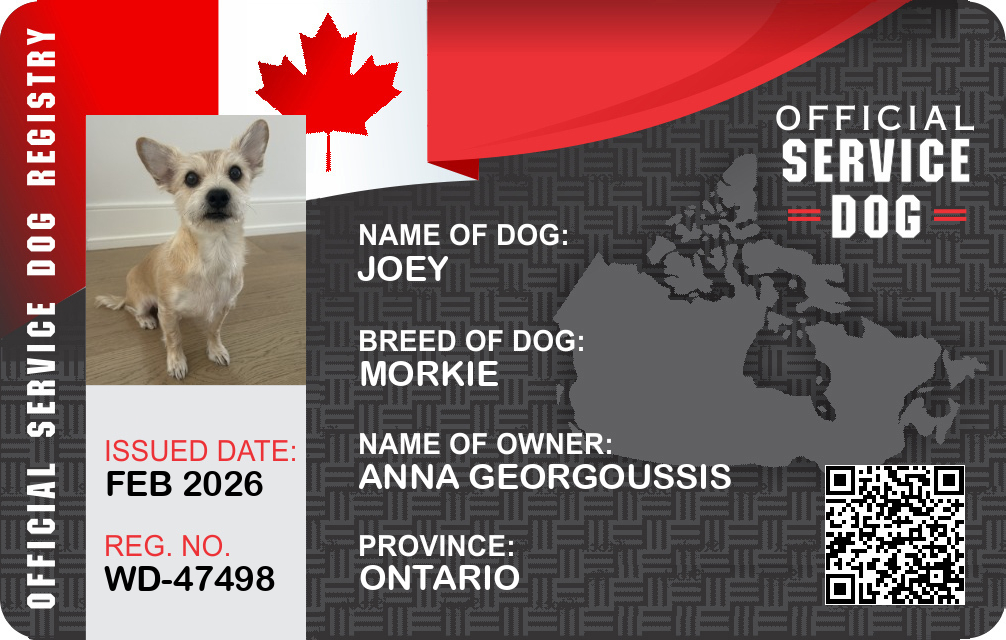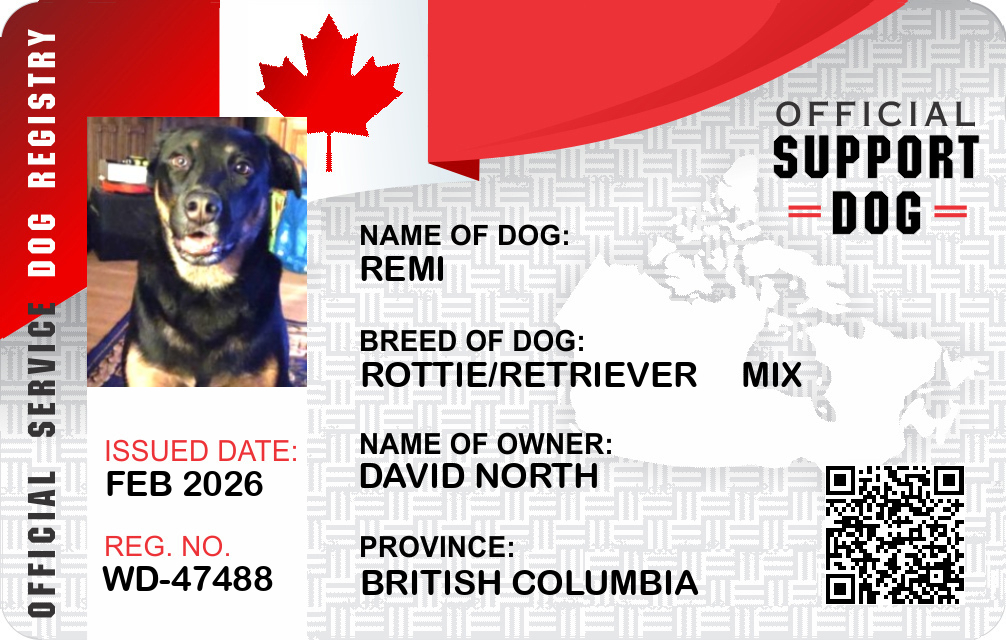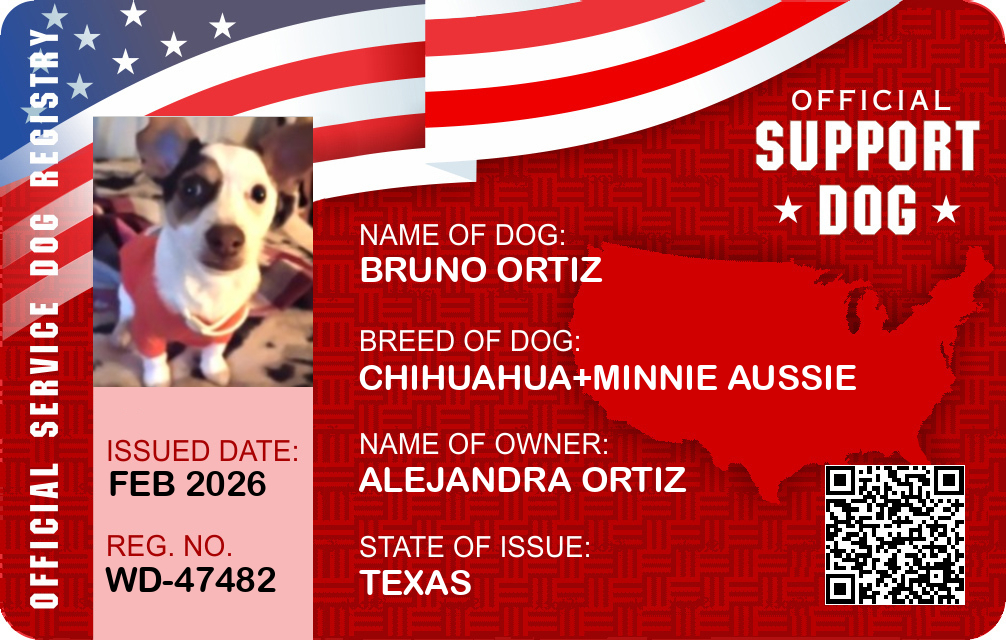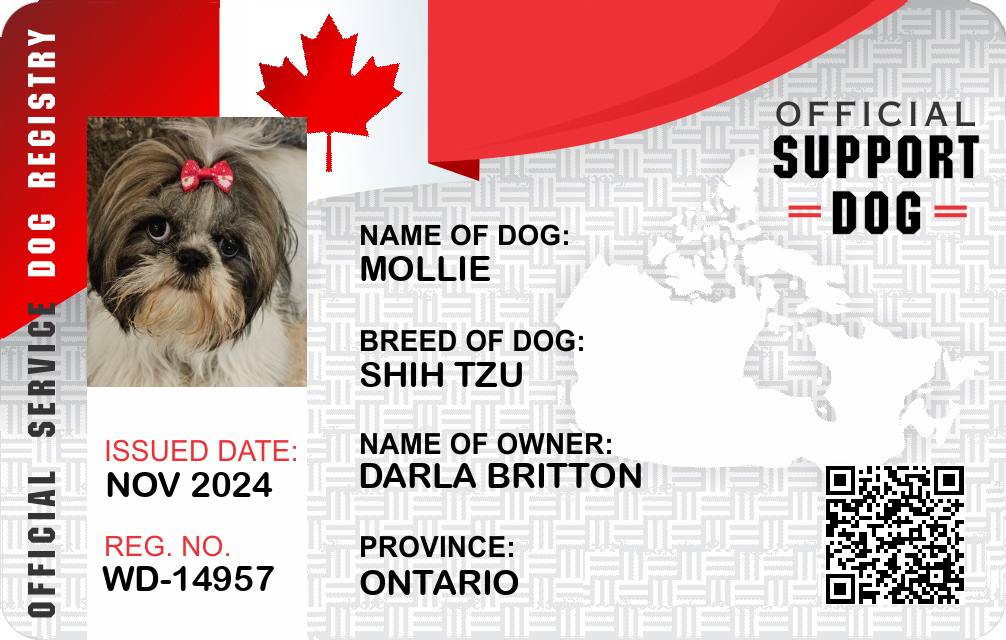Virginia Service Dog Laws
Get Your Documents
Example State Cards


Overview of Service Dog and Legal Definitions in Virginia
What is a Service Dog?
A service dog, as defined both federally and by the state of Virginia, is a dog specifically trained to perform tasks that assist an individual with a disability. These disabilities can be physical, sensory, psychiatric, intellectual, or mental in nature. The critical aspect of a service dog is that the tasks they perform are directly related to the individual’s disability. For example, guide dogs assist individuals who are blind, while psychiatric service dogs might perform tasks to mitigate the symptoms of PTSD.
How Service Dogs Differ from Other Types of Assistance Animals
Service dogs are distinct from other assistance animals such as emotional support animals (ESA) and therapy dogs. While ESA can offer comfort and companionship that alleviates symptoms of emotional or psychological conditions, they do not perform specific tasks related to a disability and thus are not afforded the same legal protections as service dogs under the Americans with Disabilities Act (ADA). Therapy dogs, on the other hand, are typically trained to provide emotional support to people in institutional settings like hospitals but are not specific to any person’s needs.
Key Federal Laws Affecting Service Dogs (ADA, FHA, ACAA)
Federal laws provide a foundational layer of protection for service dog handlers. The Americans with Disabilities Act (ADA) ensures public access rights, requiring most businesses and public spaces to allow service dogs accompanying people with disabilities. The Fair Housing Act (FHA) requires landlords to make reasonable accommodations in housing for those with service dogs, even if their property has a no-pet policy. The Air Carrier Access Act (ACAA) provides for individuals with disabilities, ensuring they can travel with their service dogs on commercial airlines without additional fees.
State-Specific Service Dog Laws in Virginia
While Virginia adheres broadly to federal standards concerning service dogs, the state extends specific rights and outlines penalties for misrepresentation. Virginia’s laws align with ADA protections, enforcing non-discrimination in public places and housing. However, the state also enforces additional penalties for those fraudulently representing pets as service dogs, emphasizing the integrity of service dog usage.
Housing Rights and Responsibilities
Under the FHA and supplemented by Virginia state law, service dog handlers have the right to reasonable accommodations in housing. Landlords must permit the presence of a service dog despite any no-pet policies and cannot impose pet fees or deposits. However, handlers must demonstrate that their service animal is necessary due to their disability. Any damages caused by the dog can still be the responsibility of the tenant.
Public Access and Accommodation
Service dogs in Virginia are allowed access to any place the public can go. This includes restaurants, hotels, retail stores, and public transportation. Businesses and public entities can’t demand documentation but may ask if the dog is a service animal required because of a disability and what work or task the dog has been trained to perform. Importantly, service dogs must be well-behaved, and their handlers must maintain control, typically by harness or leash unless the device interferes with the dog’s work or the individual’s disability.
Transportation and Travel Rules
Service dogs enjoy protections under the ACAA, allowing them to accompany their handlers on flights. Airlines may require prior notice to accommodate the service dog properly but cannot require a fee for its presence. Virginia’s transportation services must also accommodate service dogs, ensuring equal access to local transit options without imposing additional charges.
Employment and Workplace Considerations
Service dogs in Virginia are protected under the ADA, which includes the right to reasonable accommodation within the workplace. Employers must permit service dogs unless doing so poses an undue hardship on the operation of the business. As part of the accommodation request process, employees may need to provide documentation verifying their disability and how the service dog assists in performing job functions.
Documentation, Requirements, and Processes in Virginia
Service Dog Documentation and Who Can Issue It
While Virginia does not require specific certifications or ID cards for service dogs, handlers must be able to attest to their need for the service dog due to a disability and how the dog assists with their disability-related needs. Legitimate documentation can be a letter from a medical professional, but businesses requesting documentation under ADA guidelines cannot demand it as long as the dog’s service purpose is verbally acknowledged.
Landlord, Business, and Provider Verification Rules
Entities may question the validity of a service dog if the disability or necessity of the service is not apparent. They are limited to asking if the dog is required because of a disability and what tasks it is trained to perform. They cannot require proof of training, medical records, or ask about the specifics of the person’s disability.
Rights, Limitations, and Legal Risks
Rights Service Dog Handlers Have in Virginia
Virginia recognizes the comprehensive rights of service dog handlers, ensuring they have equal access to public accommodations, housing, and transportation. These rights are bolstered by federal protections, ensuring non-discrimination in workplaces and educational settings.
Limits on Service Dog Protections and Common Restrictions
Despite broad rights for service dog handlers, certain restrictions apply, aligning with both federal and state laws. Service dogs must be under control and non-disruptive. If a service dog behaves aggressively or destructively, an establishment can ask the handler to remove the dog. Service dogs are also not granted access in areas where their presence would compromise safety or fundamentally alter the nature of the goods and services provided, such as certain sterile environments.
Penalties for Fraud or Misrepresentation
Misrepresenting a pet as a service animal is illegal in Virginia, with penalties including fines. This enforcement is critical to maintaining the integrity and trust in service animals. It ensures those with genuine needs can use service dogs without public skepticism or inconvenience.
Practical Guidance for Service Dog Handlers in Virginia
How to Qualify for a Service Dog Legitimately
To qualify for a service dog in Virginia, individuals must be disabled under the ADA’s definition and require the dog to perform specific tasks related to that disability. Legitimate qualification involves consultation with healthcare providers and, often, collaboration with certified service dog training organizations.
How to Talk to Landlords, Airlines, and Employers
Communication about service dogs should be clear and factual. When addressing landlords or employers, it’s advisable to provide documentation from a healthcare provider if necessary, clearly outlining the need for a service dog. When dealing with airlines, notify the booking agency ahead of time and understand the specific policies of the carrier to ensure compliance.
Summary of Service Dog Laws in Virginia
- Service dogs are dogs trained to perform specific tasks for their handlers with disabilities.
- Federal laws such as ADA, FHA, and ACAA provide a framework of protection and rights for service dog handlers.
- Virginia law complements federal standards and includes penalties for misrepresentation of service animals.
- Handlers have broad rights in housing, public access, travel, and employment but must ensure their service dogs are consistently controlled and non-disruptive.
- No formal certification is required in Virginia, but handlers should be prepared to explain rationale for their service dog’s assistance.
- Communication with landlords, businesses, and employers should be clear to avoid disputes; preemptive clarification of rights can prevent misunderstanding.
By adhering to these guidelines and maintaining proper conduct and communication, service dog handlers in Virginia can effectively uphold their rights and responsibilities, ensuring accessibility across the state.
Get Your Documents
Example State Cards













